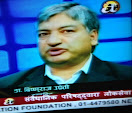COVID-19 and global order: dilemma, challenges, opportunities and scenarios
Bishnu Raj Upreti[1]
When
this virus appeared first time in Wuhan
city of Hubei Provence of China in December 2019, none of people anticipated it
will turn such serious pandemic within 4 months.
At first it was treated simply as a problem faced by Wuhan city. Once China started taking stringent measures to
control it, it started taking public attention from Europe and America. But
many political decision makers were not taking seriously. Worst example was the
responses of American President, who had even termed it as “Chinese
Virus”. Now it is moved from Chinese
problem to everybody’s problem, once it spread to South Korea, Japan and
entered to Europe. Then people realize the gravity of the problem but it was
almost late. By now (in 12 April 2020) the situation presented by World health
Organization[2]
is: a) the confirmed cases are1699595, b) confirmed death: 106138, c)
countries, areas or territories affected: 213.
This
pandemic will have direct effects on the existing global order. Many
philosophers, strategists and global affairs analysts are predicting that the
world order will drastically change or possible collapse after this pandemic. Emergence
of China as most influential global power and erosion of US influence is
evident.
In
this context some dilemma, challenges and opportunities synthesised from
different sources as well as my own reflection are presented below:
Dilemma:
·
Individual liberty
v/s right to life (human rights dilemma)
·
Investment/allocation
to basic services v/s strategic interests by powerful countries (in other word,
more investment in health services or in military affairs)
·
Focusing to poor,
marginalized and powerless or continue business as well
·
Continue the
existing highly nature-insensitive consumeristic behavior or change behavior
and be more sensitive to ecology and environment, respect nature
·
Continue current
model of globalization or rethink to make more self-sufficient, independent ….
·
Continue current
behavioral practices or move towards more spiritual, co-existence and mutual
respect patters of relation and apply the traditional practices in the eastern
value systems (e.g., namaskar instead hand shake, Yoga and meditation,
more use of vegetarian food, etc.)
·
Continue to open
international border provisions existed in many countries or close (regulate
them),
·
Donald Trump
approach of America first[3] or usual international
relations,
·
Continue the
existing practice of ‘sanctions and financial and economic pressure’ used by
powerful countries or relax them to humanitarian ground.
·
“West-centric” v/s
‘East-centric’ development paradigms
·
Continuity of existing
unbalanced market configuration v/s finding for ‘new equilibrium’
Challenges:
·
Addressing effects
of the COVID19 in economy, society, politics,
·
Restoring
psychological welling of people that is eroded by COVID19
·
Restoring trust of
people to their governments and political leaders
·
Providing
employment opportunities for the people
·
Ensuring food
security especially to poor and marginal people
·
Restoring tourism
sector
·
Possible use of
restrictive measures
·
Existential
problem of influential international organizations promoting globalization,
capitalistic and power centric forces like World Trade Organization
·
Possibility of
emergence of autocratic, oligarchic forces and threat to liberal
democracies
·
Challenges brought
by global shocks and stresses are excellent time for searching for and finding
of new opportunities
Opportunities:
·
Evaluate the
quality of leadership based on their work at the time of COVID19 Crisis
·
Review, refine and
or bring new policies, laws and
regulations, new structures and procedures for more socially responsive,
environmentally friendly and people-centered actions
·
New research and
innovation
·
Restoration of
indigenous good practices that were displaced by the process of globalization
·
Returning back to
own culture, tradition and good practices (e.g. naturopathy, use of medical
herbs, etc.), which were replaced together with expansion of globalization
effects at local levels (e.g., people drink Coca-Cola by selling milk to
others)
·
Revival and or
strengthen health care system at local level
·
Realization of
limit of globalization by the bare advocate of globalization as the only
solution of every economic problems.
·
Developing
self-sufficient food system, supply mechanism, emphasis of agriculture
·
Realization of
limit of wealth, power and prestige and change behavior by those who always
feel proud of their wealth hand power.
·
Regulating borders
·
Reviewing the
performance of development cooperation models, works of INGOs and other
international institutions
·
Promote and expand
domestic production in selected strategic sectors such as food and
pharmaceutical industries.
Scenarios
1. Normal:
Global order as usual with some minor modifications and existing power dynamics
remains intact. This is less likely though.
2. Change
in power dynamics: Major change, new power players emerges and old power
players struggle to keep t heir zone of influence. This is likely case.
3. Fundamental
change in power dynamics and emergence of China as most powerful nation in the
world and leading role in shaping global order.
This is more likely scenario.


No comments:
Post a Comment